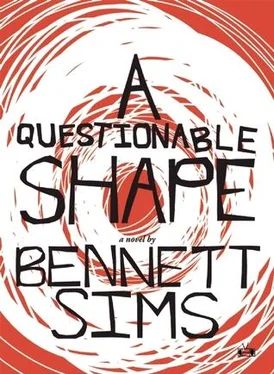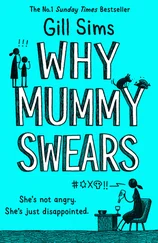61
I employed my usual trick, of focusing on the power light of Rachel’s computer speakers across the room. In the perspectiveless blackness, this glowing green bead (floating where Rachel’s desk should be) always seems suspended in infinite interstellar space. Nothing is visible but it, a pseudo-sidereal point of light, with cavernous darkness between us. To help myself fall asleep, I like to imagine that I am an astronaut adrift on a NASA mattress, at the very edge of space (where there are no more stars, only far chill emptiness), and that the point of light that I’m descrying is actually a rift at the end of the universe, a tear in the black fabric where the cosmos stops. Having reached the point where the expanding universe finally dead-ends, I am glimpsing what lies beyond it: I can see the obverse side of spacetime, shining through this tiny chink. This keyhole into something inconceivable and green. As I said, I frequently play this game with Rachel’s speaker bead, but today was the first time that it occurred to me to compare it to undeath. Perhaps this is what it is like to be undead, I found myself thinking. You cross infinite darkness, with only a virid dot in the distance, shining like a Bethlehem star. At the far edge of the blackness of your mind, you see this single stab of green: the little gleam of what’s left alive in you, visible through a rift in the underworld. And condensed into that dimensionless point would be all the memories that you are trying to get back to, there on the mortal side of your life. In my case, Tunica, the apartment, and the campus lawn would all be compacted together, stelli-fied, pulling at me with their green gravity. And so as I lay there (drifting into half-sleep, feeling myself drift toward this bead, as if caught in its nostalgic tractor beam), I thought, dreamily, ‘This is what it is like to be undead.’
62
Earlier that same week, during a heavy summer thunderstorm, one of Baton Rouge’s processing centers — i.e., the temporary way stations where LCDC vans can unload their undead, until space has been made for them at an actual quarantine — lost power and suffered a security breach. LCDC was equivocal about what happened, but a guard was rumored to have been careless, and was bitten, and certain fail-safes would appear to have failed. The upshot is that a dozen undead managed to escape from the so-called processing center (in fact a high-school gymnasium in a residential neighborhood) and to go on a biting spree, infecting more than twenty nearby civilians, including three small children. The public uproar surrounding ‘the spill’ (as newscasters decorously referred to it) eventually led to the decommissioning of residential processing centers altogether. As a result, unprocessed undead are now being housed on cargo ships and barges on the Mississippi — far from any neighborhoods — while officials weigh all the options for some more permanent solution. Naturally, these ‘death ships’ (as talk-radio pundits fearmongeringly refer to them) have only escalated debates over hurricane season, which is all that pundits seem to be screaming about, these days. What if New Orleans floods, they scream? Or Slidell? Or New Iberia? Tropical storms have already begun brewing off the coast, and earlier on in the season hurricanes hit Veracruz and Cuba, which came to serve as worldwide object lessons in disaster preparedness: floodwaters freed floods of undead from the quarantines, and both governments — unprepared, underfunded — were powerless to prevent mass outbreaks. As pundits like to point out, the same thing could easily happen here. So FEMA, anxious to avoid any similar swivets stateside, has been urging all of the Gulf Coast towns to evacuate their quarantines, and to ship their undead to safer cities. So far, none have.
63
For instance, when Rachel and I first moved in together, I read the books that lined her shelves, because I thought that these would give me special access to her, teach me a little about her, just as eating her favorite brand of cereal (Special-K bran flakes littered with dehydrated strawberry shavings, little tart discs of bloodred that puckered my mouth to suck on them) taught me of her tongue, taught me the taste of her mornings and some midnights. I would study her copy of Lolita and try fervently to imagine her reading it — under what skies, in what seasons, with what things on her mind — as if all these granular traces of her could be scraped from the page by my reading, like breadcrumbs from a tablecloth, into the eager maw of my heart. This particular project tapered off gradually as we lived together, as she began to seem less inscrutable and more human and as I began to feel less pressured to solve the mystery of her loveliness. But even now it gives me pleasure, flipping casually through one of her novels, to see her pleasure on the page. To see which passages she has underlined or, as if they were correct answers, scrawled checkmarks next to. Even when I was reading my own copies of books, I strove to read them somewhat with Rachel’s eye. Whenever I came across a passage that reminded me strongly of ones that she had underlined; or that called to mind an anecdote or key term or in-joke that we shared; or that contained some visual detail that, it struck me, she herself would be liable to notice, I wrote her name there in the margin: ‘Rachel,’ loveliest apostil. What was I doing? At the time, I conceived of it as a squirrel’s project. I was burying her name in forgettable places so that, skimming through these books in a few years (perhaps after we had separated, perhaps after I had even forgotten her), my eye would be surprised by her name in the margin. Reading over the annotated passage, I would then be able to unearth from forgetfulness the day that I had marked it, as well as whatever memory of Rachel it had reminded me of in the first place (that scene she’d underlined in Lolita ! that anecdote! our in-joke! — Rachel!), bringing on a remembering in my chest just charged with unbearable joy and suffering. And if, like the squirrel who forgets where half its acorns are buried and leaves them forever in the dirt, I happened never to skim through some of the books again, all the better, for her name would have time to take root and grow there, oak of unbearable joy and suffering.
64
I never could have read if I knew, really understood and knew , that there was no such thing as true progress: that I was trapped on an Eleatic treadmill, a Zeno-esque hamster wheel. Deep down I had to convince myself, delusionally or not, that I was nearing a definite end to my scholarship. Whereas the moment I accepted the futility of my task, I would have had to quit. ‘For then,’ Nietzsche writes in The Birth of Tragedy , I ‘would have felt like those who wished to dig a hole straight through the earth: each one of them perceives that with his utmost lifelong efforts he can excavate but a very small portion of the enormous depth, and this is filled up again before his eyes by the labor of his successor, so that a third man seems to be doing a sensible thing in selecting a new spot for his attempts at tunneling. Now suppose some one shows conclusively that the antipodal goal cannot be attained thus directly. Who then will still care to toil on in the old depths, unless in the meantime he has learned to content himself with finding precious stones…?’
65
Hundreds of hours, it turned out, thousands, a statistic of near-astronomical scale that had the power, in the shock of its high number and in its vertiginous mathematical sublimity, to wake me momentarily from my dazed reading and force me to consider all of the activities I might have been pursuing in that time instead: lovemaking, windsailing, preparing elaborate meals, all glimpsed in breathless montage, like the life I hadn’t lived flashing before my eyes.
Читать дальше












